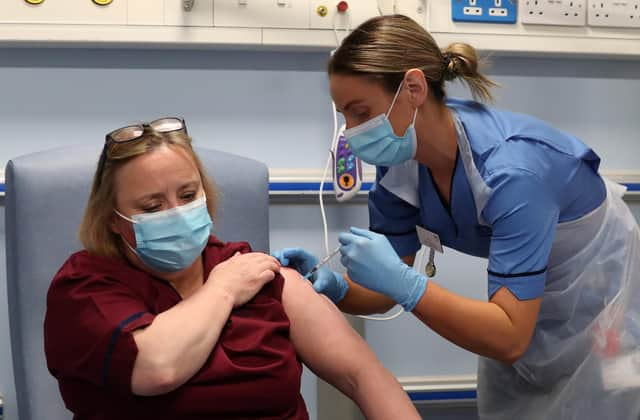Staff vaccination is not a clear-cut issue - Laura Morrison


Under UK legislation, people must consent to the vaccination; no one can compel someone to receive it. The UK Government has ruled out making a Covid-19 vaccination mandatory. So where does this leave employers keen to take steps to get back to normal operations?
In practice, this is a theoretical question for now, given the vaccine supply and roll-out programme. It is likely to take many months before we reach the stage of vaccines being available on demand. At the moment, it will not be practical to make a vaccination mandatory to attend work.
Advertisement
Hide AdAdvertisement
Hide AdEven if it were widely available now, it would remain difficult for an employer to mandate this where employees have successfully worked at home for many months and might argue they can continue to do so indefinitely. The risk of community transmission triggering an absence from work is unlikely to justify a policy of mandatory vaccinations. A heavy-handed approach will also have implications for employee relations.


For those who are sharing a physical workplace, employers will be mindful of their health and safety duties. Under the Health and Safety at Work Act 1974, employers must take reasonable steps to reduce any workplace risks. Employers have already put in place numerous safeguards to ensure safe working in shared spaces during 2020. Health and safety obligations might support a best practice approach of encouraging employees to have a vaccination, but it is a big leap from there to making it mandatory. Not even the NHS is making vaccination compulsory for its employees.
Employers also need to consider the risk of discrimination claims. For example, an employee might refuse to have the vaccination on the grounds of a religious or philosophical belief. The employee would first have to demonstrate that the belief met the threshold for legal protection. Whilst an employee might struggle to persuade a tribunal that a general anti-vaccination belief warrants protection, a more specific belief based on religion or, say, ethical veganism may well qualify.
Similarly, an employee may have medical reasons for not having the vaccination. Pregnant women, and those who have serious allergies, are among those currently advised not to have the vaccination. A mandatory vaccination policy would discriminate indirectly on the grounds of pregnancy and potentially disability (depending on the medical reasons concerned), as well as on the grounds of a religious or philosophical belief.
In those situations, an employer would have to be able to justify a mandatory vaccination policy objectively. Much will depend on the sector and the employer's circumstances. There will be limited situations in which an employer could make a strong case for a mandatory policy. An employer may be able to justify a targeted policy for those of its employees who work with vulnerable service users, for example. This will be the exception to the rule.
As a further complication, employees might cite their article 8 right to a private life as a basis for not informing their employer whether they have had a vaccination. Employers will also need to be mindful of data protection. Health data is special category data under the GDPR. That means more stringent conditions apply to employers' ability to process that data.
Governments around the world have bought almost all supplies of the vaccinations; pharmaceutical companies have promised to prioritise supplies to them. This means that employers will not have the option of organising workplace vaccinations in the short to medium term.
If it transpires that we need an annual COVID-19 vaccination, then, in the longer term, employers may wish to facilitate vaccinations alongside any existing annual flu vaccination programme. The safest approach for most employers will be to provide the opportunity to have the vaccination, but not make it mandatory. In the meantime, measures employers have put in place during 2020 to minimise the risk of workplace transmission will be with us for some time to come.
Laura Morrison, Managing Practice Development Lawyer, Dentons